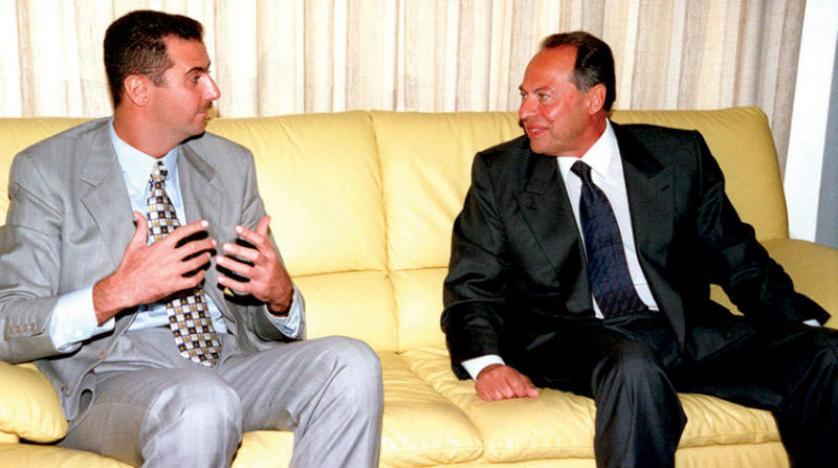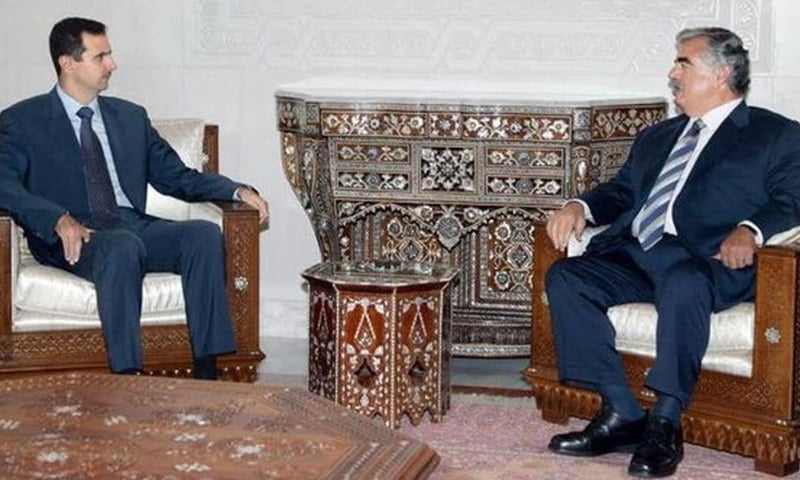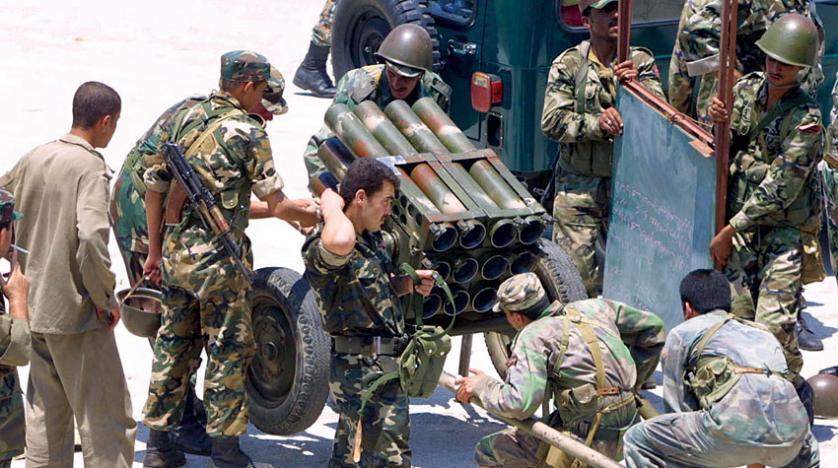In this second episode of the memoirs of late former Syrian Vice President Abdel Halim Khaddam, Asharq Al-Awsat focuses on President Bashar al-Assad’s decision to extend the term of then-Lebanese President Emile Lahoud and efforts to persuade then prime minister, late Rafik Hariri, to agree to the extension.
“The Lebanese public opinion was divided between an overwhelming majority opposing the extension and a minority supporting it, in addition to total international rejection,” Khaddam wrote in his memoirs.
He noted that a meeting between US President George W. Bush and his French counterpart, Jacques Chirac, in June 2004 underlined the two countries’ “categorical rejection” of Lahoud’s term extension and denounced the Syrian interference in Lebanese affairs.”
With the expansion of the opposition at the Lebanese, Arab and international levels, in parallel with calls to stop the Syrian interference and the withdrawal of the Syrian troops from Lebanon, it was clear that “any irrational position from the regime in Syria will lead to great damage to the country.”
Khaddam continued: “During my meetings with Dr. Bashar al-Assad, I tried to convince him of the danger of the extension.”
He noted that Assad exerted great pressure on Hariri. Following a meeting in July, held in the presence of Major General Ghazi Kenaan, Brigadier General Rustom Ghazali and Colonel Muhammad Khallouf, Hariri suffered from high blood pressure and nosebleeds due to Assad’s harsh words.
Khaddam said: “On that morning, I had an appointment with Dr. Bashar. He was upset and tense, and said: ‘I had Rafik Hariri. I received him at 7:30 in the morning, and I told him clearly and frankly, in the presence of the officers, that he was not allowed to choose a president, for I am the one who chooses, and whoever disobeys me will have his bones broken.’”
The Syrian vice-president expressed his shock, telling Assad: “What have you done? You are talking with the prime minister of Lebanon who represents the Lebanese Muslims. Did you think about the impact of your words if they spread? We have worked for many years to give the prime minister and the speaker of the parliament a fundamental role, and you are working for Emile Lahoud to weaken this role. You have no interest in that.”
Assad calmed down and said: “Invite Prime Minister Hariri to visit you and work to erase the outcome of my meeting.”
“I will do that,” Khaddam replied.
Khaddam recalled that he contacted Hariri and blamed him for having come to Damascus without calling him.
“I wait for you to come to Damascus within days,” he told the Lebanese premier, who replied: “I was in a very bad condition; that’s why I didn’t contact you. I will not visit Damascus again.”
The two men had a long conversation, after which Khaddam convinced Hariri to meet with him in Bloudan, near Damascus.
“I will not forget my meeting with Bashar al-Assad for as long as I am alive,” the Lebanese politician told Khaddam.
“You are a political man, and you should not take things like this,” his interlocutor said, emphasizing that Assad was angry as he spoke to him.
Khaddam said that during that encounter, he tried to reduce the tension between the Syrian president and Hariri.
He continued: “On August 18, 2004, I met with President Assad to bid him farewell before my trip to France for my annual medical examinations. During that meeting, we discussed the issue of the extension of Lahoud, and I asked him: ‘Where are we with this issue?’ He replied: ‘I decided not to extend his tenure. No one in the world agrees with it; Arab countries and the majority of the Lebanese are against it. I informed President Lahoud of our decision.’”
A few days later, while he was in France, Khaddam received a phone call from Hariri, who told him that Assad had again decided to extend Lahoud’s term and that he had summoned him to Damascus for a brief meeting.
“You have to define your stance: Are you with or against Syria?” Assad reportedly asked Hariri during that meeting.
The Lebanese premier asked for Khaddam’s advice, noting that Druze Leader Walid Jumblatt has warned him that he could not bear the consequences of his rejection of the Syrian decision. The Syrian official agreed, encouraging Hariri to agree then to leave Lebanon and announce his resignation. Hariri informed Brigadier General Rustom Ghazali of his approval, then left for Sardinia to meet his family there.
Khaddam recounted: “A few days later, he called me, while I was still in France, and asked me: ‘If I go back to Lebanon, is there a threat to my life?’ I replied: ‘You have agreed to everything that Dr. Assad requested and he still needs you, because the amendment of the constitution is yet to be made. But, as I advised you, after completing the task, leave Lebanon immediately and announce your resignation.’”
During that period, European countries were seeking to adopt a United Nations Security Council resolution on Lebanon and the Syrian troop withdrawal. Assad asked his foreign minister Farouk al-Sharaa to contact his Spanish counterpart, Miguel Angel Moratinos, to ask him to support Syria and to stop the Security Council from meeting, in return for Damascus’ to abandon the extension of Lahoud’s term and to hold presidential elections instead.
Spanish Prime Minister José Luis Zapatero exerted great efforts with Bush, British Prime Minister Tony Blair and Chirac, who finally agreed to cancel the Security Council session if Syria fulfilled its commitment.
Moratinos contacted Sharaa and informed him that Western countries agreed to the Syrian proposal. He hoped that the Syrian side would contact parliament Speaker Nabih Berri to cancel the parliament session devoted to amending the constitution to extend Lahoud’s term. Sharaa replied: “Lebanon is an independent state, and we have nothing to do with it. You call Speaker Nabih Berri.”
The Spanish minister was surprised by this answer. Nevertheless, Moratinos called Berri and recounted what happened. Berri replied: “Lebanon is an independent and sovereign state, and Syria has nothing to do with this issue.”
Consequently, the Security Council met on Sept. 2 and issued Resolution 1559, calling on Syria to withdraw its forces from Lebanon and to stop interfering in its internal affairs. It also included Lebanon’s call for presidential elections without outside interference. The resolution affirmed the country’s independence and sovereignty and called for the dismantling of non-state armed organizations. The decision was issued under Chapter Seven of the United Nations Charter, and thus the Syrian regime came under the supervision of the Security Council.
Khaddam recalled: “I returned from France on Sept. 5, 2004. The next day, President Assad received me, and after a chat about my medical examinations, he spoke about his meeting with US Congressman Darrel Issa, who expressed his willingness to exert efforts to improve Syrian-American relations.” He also briefed him on a meeting with Martin Indyk, the former security advisor to US President Bill Clinton, who was highly critical of Bush’s policy.
“The two men have no role in making American policy,” Khaddam told Assad, who replied: “We will receive a large US delegation headed by William Burns, Assistant Secretary of State for Middle East Affairs… The United States does not care about Lebanon, but Iraq.”
Assad continued: “What is better: focus on American-Syrian relations or Syrian-European relations?” Khaddam answered: “The United States is the most influential power in the world, and focusing on relations with it is better, but the major obstacle is Israel’s position in US politics. As for Europe, its impact is limited, but working with it is much easier than working with the Americans.”



